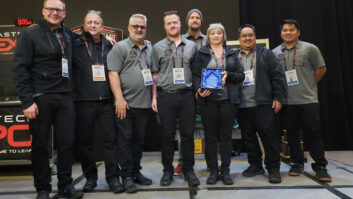Minneapolis – Best Buy CEO Brian Dunn has won TWICE Magazine’s inaugural Best Retail Executive Award.
Fifteen months into his role as chief executive, Dunn earned the honor for taking the reins of the world’s largest CE chain during a global economic crisis – and keeping the enterprise on an even keel with his vision of a connected world and a shirt-sleeve management style that has endeared him to his tens of thousands of employees.
As Dunn himself recounted in November 2008, just two months after the near-meltdown of the world’s financial markets, business dropped off so abruptly in late September that Best Buy was unable respond fast enough to the new marketplace realities. The company “made a lot of adjustments but couldn’t change fast enough,” he said, given the three to four weeks it took the then $40 billion retail giant to alter course.
Dunn described the environment at the time as the most challenging he’d seen in his 23 years with Best Buy. “It’s difficult as a retailer to plan,” he said, given the whipsaw effects of the financial markets and the fact that no one could predict the duration or the severity of the downturn. “It’s a real tough nut to crack.”
In hindsight, Best Buy’s new skipper was well-prepared for the economic storm. As chairman and founder Dick Schultze noted when Dunn was first named to succeed CEO Brad Anderson in January 2009, “Brian has demonstrated a rare ability to connect with people and inspire them to work together to accomplish extraordinary things. Dunn is a product of – and a steward of – a unique culture at Best Buy that continues to drive the company’s performance. We’re pleased and excited that Brian has accepted this new role and will be leading our company through future challenges and toward new and exciting opportunities ahead.”
Dunn’s humble beginnings at Best Buy gave little hint to the crucial role he would later play. He joined the company in 1985 as a sales associate at the suggestion of his mom, who had started at the chain’s precursor, Sound of Music, and would later launch its co-op advertising department.
“My mom worked here for 18 years and brought me in because this is a company where ordinary people create extraordinary things,” he told TWICE on the eve of his ascension to CEO. “I saw my commitment to that – although the paradox is that there are no ordinary people.”
Dunn was later promoted to assistant store manager, which meant during the days of Best Buy’s commissioned sales force that “I had to take a massive pay cut,” he recalled during the Consumer Electronics Association (CEA) CEO Summit in June. But by 1989 he was managing his own store, and the next year became a Minnesota district manager.
By 2000 Dunn was senior VP of Best Buy’s East Coast operations, and was named president of retail North America in 2004. Two years later he succeeded Al Lenzmeier as president/COO, and rose to CEO in June 2009.
As chief executive, Dunn said he would continue to build the company upon the foundation set by Schultze and his mentor Anderson, with whom he had worked closely for a decade.
“The course Dick started and the customer-centricity platform that Brad initiated is absolutely the right direction,” he told analysts and investors last year. “My job is to take that into the digital era, to get connected with our customers and help them service up their lives.”
Enter Dunn’s “connected world” strategy, which leverages the growing interplay between the “three screens” – TVs, computers and cellphones – and the digital content and broadband and mobile connections to drive them. As he noted during a second-quarter earnings call last month, connectivity has brought the CE industry to “a pivotal, transformational inflection point,” on par with the analog-to-digital transition that began 15 years ago.
“The customer wants to be connected all the time,” he said, “and we are a one-stop shop for all their connectivity needs.”
To that end, Best Buy is revamping the center of its stores by downsizing its slow-turning CD and DVD sections in favor of an expanded wireless department and dedicated sections for nascent categories like e-book readers and motion-sensor video gaming.
Under Dunn’s watch the chain has also expanded its digital content delivery services beyond Napster music downloads through a partnership with Sonic Solutions. The deal allows Best Buy to sell, market and promote that company’s Roxio CinemaNow video-streaming services in packages with broadband services and various connected devices.
Best Buy’s other key growth engine is its international operations, which now span Europe, China and North America. Aside from driving revenue for the now $50 billion-plus retailer, the far-flung enterprise also provides a global pool of operational and business insights from which to draw.
“We’re going to recombine our DNA,” Dunn said, citing the successful Best Buy Mobile joint venture with Britain’s Carphone Warehouse as a prime example. “We took [Carphone Warehouse’s] expertise and vendor relationships and connected technologies in ways that make sense. We’re going to do more of that.”
At the same time, the deep economic downturn has also tempered Dunn’s game plan for the company. “We’ll re-sharpen our value message and remind consumers that we have great prices and offer great value, from the opening price point up to white-glove treatment,” he told TWICE last year.
What hasn’t changed is a shirt-sleeve management style born of his store-level background, which has kept him plugged in at all operational levels. “I’ve been an operator for a long time and context is very important to me,” he said on the eve of his CEO assignment. “I will talk to store personnel and walk the factory floors of Asia. I’ll push the business and cajole it, but I’ll step away from it too, to spend more time with our vendors, with our folks in Washington, and with all of our constituencies, to come up with new solutions for our customers around the world.”
So how’s he doing 15 months into his tenure as Best Buy’s chief executive? The numbers speak for themselves. Profits for the company’s just-reported second fiscal quarter – an especially brutal period for CE retailing – trounced analysts’ estimates by soaring more than 60 percent to $254 million, thanks to better inventory management, reduced capital spending, a higher mix of high-margin connected products and lower promotional costs.
In a statement, Dunn said he was impressed with the company’s performance “in a quarter with constrained consumer spending,” although his assessments of his own performance have been typically more reserved. During a one-on-one interview with CEA president/CEO Gary Shapiro during the trade association’s CEO Summit in June, Dunn conceded that “I thought I was going to be smarter … when I took this job. As CEO you want to have the intelligence and vision,” although it is also important for executives to “know what you don’t know and ask, ‘Explain that to me.'”
Indeed, good communication is crucial for Dunn, particularly in vendor relationships. “I need, crave, open conversation,” he told Shapiro. “What’s working, what isn’t and what we can partner on, and what we can’t. If you have problems, air it out. I appreciate it, even if our team doesn’t. I think feedback is a gift.”
Going forward, Best Buy watchers should expect the unexpected, based on Dunn’s oft-stated embrace of change. Despite being “quite change-resistant” earlier in his career, when for example Best Buy moved to a non-commissioned sales model, he now understands that “Change breeds success … and resistance makes companies monuments in themselves. In other words, you’re dead before you’re sick.”
The theme of change also infused Dunn’s first address as chief executive. Speaking to shareholders at corporate headquarters last year, he noted that Best Buy has succeeded by breaking old business models before they became obsolete, and will continue to “embrace challenge and change.”
Dunn described the company as “restless,” and said it repeatedly overcame critical challenges during its history by making daring, game-changing moves including the switch to a non-commissioned sales model in the 1980s, improving efficiencies and margins by standardizing operating procedures in the 1990s, and embracing the consumer-focused and employee-empowering customer centricity model in the 2000s.
Best Buy’s restlessness is also fueled by a healthy dose of paranoia, given the competitive threats presented by Walmart and Amazon.com. As Dunn told Shapiro, “We are proud what we have done … and paranoid that it will be taken away in two weeks.”
But underlying it all for Dunn and Best Buy is an enthusiast’s love of CE and an appreciation of the consumers they serve. “Our industry connects prices to services consumers crave and desire, connects to people and the things they love,” he said. “Our core philosophy is putting technology at the service of our customers.”












